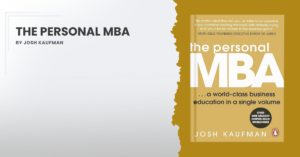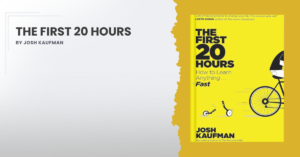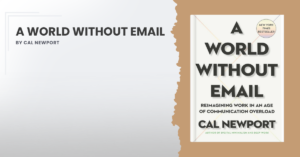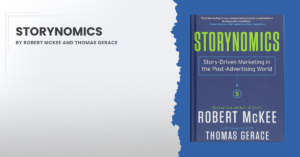Title: Lean Impact: How to Innovate for Radically Greater Social Good
Author: Ann Mei Chang
Year: 2018
Pages: 304
Are you fed up with the status quo of social and environmental challenges?
Despite investing heaps of time and money into these problems, it can feel like we’re hardly scratching the surface.
But hold on tight – what if there was a new way to achieve exponentially greater impact and make a real, meaningful difference in the world?
Enter Lean Impact by Ann Mei Chang, a game-changing book that shows us how to harness the power of innovation to create radical social good.
As a result, I gave this book a rating of 7.0/10.
For me, a book with a note 10 is one I consider reading again every year. Among the books I rank with 10, for example, is Dale Carnegie’s How to Win Friends and Influence People.
Key Lessons from Lean Impact
With insights from working across multiple sectors and interviewing over 200 organizations globally, Chang delivers a fresh and bold approach to reaching ambitious goals.
By leveraging customer insight, rapid experimentation, and a no-holds-barred focus on impact, “Lean Impact” offers a roadmap to maximize your social impact and scale up your efforts.
So grab a cup of coffee and get ready to dive into the exciting ideas presented in Lean Impact – we’ll explore how they can help you supercharge your social impact in a way that’s both effective and inspiring!
Innovation driven by a social purpose is significantly more challenging than innovation driven by profit. Profit-oriented businesses can focus solely on their products or services, while social purpose organizations must navigate complex environments with multiple stakeholders and beneficiaries, limited resources, and significant risks.
Despite this, most agree that we require significant innovation to address the scale and complexity of social challenges. So, why hasn’t purposeful innovation received the attention it deserves?
Lean Impact aims to highlight why we must do more to support non-profits, social enterprises, and other social purpose organizations in adopting and fully embracing social innovation as a holistic growth engine.
We must equip them with the best methodologies to increase their impact and drive progress towards the maximum good possible.
By doing so, we can shift from simply doing good to achieving the most significant positive impact possible.
According to Ann Mei, it’s crucial to “think big” when approaching social challenges to achieve successful solutions.
By envisioning social change at the highest level of the problem, a greater number of people can be helped compared to focusing only on conservative goals.
While thinking big is not a new concept, non-profits should ask themselves the question: “Are we trying to empty the ocean with a spoon?”
Lean Impact observes a worrying mismatch between the scale of global concerns and the strategies being deployed to solve them. Social good organizations often neglect “audacious goals” and focus on what seems possible.
However, this results in merely “doing some good” instead of aiming to completely eradicate a issue that affects numerous people.
Only by setting ambitious goals that match the scale of the difficulty can they make a significant impact.
Ambitious goals must also be clearly articulated, specific, measurable, and actionable. Incremental thinking is satisfied with 10%, while exponential thinking aims for 10X.
It is exponential thinking, rather than linear or incremental thinking, that leads to groundbreaking results.
While thinking big is important, it doesn’t mean that you have to tackle an enormous issue in one go. If an easy fix to the problem existed, someone would have already found it. Starting small allows for testing solutions and gathering feedback from customers or users with minimal resources such as funding and manpower.
Ann Mei refers to this process as the Value > Growth > Impact hypothesis.
The role of social impact organizations is to solve each circle in order to reach the middle sweet spot, which is a social innovation that can tackle the problem at scale.
The main concepts in “Lean Impact” include leveraging innovation to achieve radical social good, using customer insight and rapid experimentation to develop effective solutions, and focusing relentlessly on impact and measurable outcomes.
Lean Impact also emphasizes the importance of embracing solutions that are embraced by beneficiaries, address root causes, and are scalable enough to meet the scale of needs.
It highlights the value of incorporating diverse stakeholder perspectives and sharing knowledge and resources across sectors to maximize social impact.
Ann Mei Chang draws on her extensive experience working in the private, public, and non-profit sectors to provide a fresh perspective on how to tackle some of the world’s most pressing social and environmental challenges.
At the heart of “Lean Impact” is the idea that we need to approach social impact work with the same rigor and focus on innovation that has driven so many technological breakthroughs.
Chang argues that by adopting a Lean Startup approach, which involves rapid experimentation, iteration, and continuous learning, we can develop solutions that are more effective, efficient, and scalable.
One of the key takeaways from the book is the importance of focusing relentlessly on impact and measurable outcomes.
Chang stresses the need to set clear goals, track progress, and make data-driven decisions to continuously improve and optimize our efforts.
Another important concept in “Lean Impact” is the value of incorporating diverse stakeholder perspectives and sharing knowledge and resources across sectors.
Chang encourages social impact organizations to work collaboratively and to prioritize solutions that are embraced by beneficiaries, address root causes, and can be scaled up to meet the scale of needs.
My Book Highlights & Quotes
Impact is a critically important concept when it comes to social innovation, generally used in the context of measuring whether social interventions do or don’t work. But conceptually, it’s very similar to the problem of measuring success in a business before you have profits. That’s why lean methods are so perfectly suited to this kind of work. The only real difference is that instead of talking about maximizing shareholder value, Lean Impact talks about maximizing social impact. An advance party of pioneers, some of whom you’ll read about here, is already doing this, but we need more. This book is a way to help add to their numbers. Lean Impact is not only transformational for the social sector, though. My hope is that people in other kinds of businesses and organizations will also pick it up and, after reading about the dedicated people and clear strategies whose stories Ann Mei has gathered, think about how the products and institutions they build affect the world. All of us have more to learn about how we make impact so we can move together into this new era
To satisfy all the crisscrossing priorities of multiple donors, organizations can end up tying themselves into a pretzel
Let’s be real. Innovation for social good is harder than innovation for business. Period
One reason undesired interventions persist for longer in the social sector is that frequently it is funders rather than consumers who are paying for them
To maximize our chance of success amid such complex challenges, we need a methodology to manage risk and accelerate learning
Overall, “Lean Impact” is a must-read for anyone who is passionate about social change and wants to make a real difference in the world.
It offers a roadmap for achieving ambitious goals through customer insight, rapid experimentation, and a relentless pursuit of impact.
I am incredibly grateful that you have taken the time to read this post.
Do you want to get new content in your Email?
Do you want to explore more?
Check my main categories of content below:
- Agile
- Blog
- Book Notes
- Career
- Leadership
- Management
- Managing Yourself
- Productivity
- Project Management
- Technology
- Weekly Pulse
Navigate between the many topics covered in this website:
Agile Art Artificial Intelligence Blockchain Books Business Business Tales Career Coaching Communication Creativity Culture Cybersecurity Design DevOps Economy Emotional Intelligence Feedback Flow Focus Gaming Goals GPT Habits Health History Innovation Kanban Leadership Lean Life Managament Management Mentorship Metaverse Metrics Mindset Minimalism Motivation Negotiation Networking Neuroscience NFT Ownership Parenting Planning PMBOK PMI Politics Productivity Products Project Management Projects Pulse Readings Routines Scrum Self-Improvement Self-Management Sleep Startups Strategy Team Building Technology Time Management Volunteering Work
Do you want to check previous Book Notes? Check these from the last couple of weeks:
- Book Notes #123: The Personal MBA by Josh Kaufman
- Book Notes #122: The First 20 Hours by Josh Kaufman
- Book Notes #121: A World Without Email by Cal Newport
- Book Notes #120: Storynomics by Robert McKee and Thomas Gerace
- Book Notes #119: Getting Things Done by David Allen
Support my work by sharing my content with your network using the sharing buttons below.
Want to show your support tangibly? A virtual coffee is a small but nice way to show your appreciation and give me the extra energy to keep crafting valuable content! Pay me a coffee:





